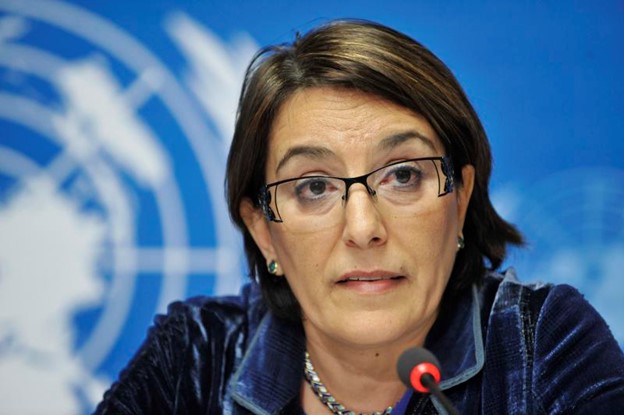By: Payton Focht and Beatrice Serra/ GICJ

Racism is a growing problem globally, not because it is a new concept but because people are unaware and unwilling to address how society and written laws disproportionally effects people of African descent. What we need is transformative change, and to do this, we need to look closely at those areas requiring real action. Ms. Mona Rishmawi (Chief of the Rule of Rule of Law, Equality and Non-Discrimination Branch, OHCHR) stated the importance to recognize the complexity of racial issues. She quoted from a victim’s family member, “You gave them back their dignity” to the OHCHR.
On 18 October, Ms. Mona Rishmawi told the participants of the 19th Session of the Intergovernmental Working Group on the effective implementation of the Durban Declaration and Programme of Action (Geneva, 11-22 October 2021) of the importance of the latest report (A/HRC/45/48) on “the Effective Implementation of the Durban Declaration and Programme of Action” published by the WG.
The report came about after the killing of George Floyd and the large-scale protests, despite being in the depths of the Covid-19 pandemic. The Human Rights Council held an Urgent Debate on Racially Inspired Human Rights Violations at the 43rd Session. At the time and the Council agreed on a mandate surrounding three issues: the killing by law enforcement officials, how to support victims and hold perpetrators accountable.
When educating themselves about this growing issue and working towards a solution, the WG realized that despite numerous recommendations and suggestions, it is necessary to cluster the issues to bring about real change. Systemic racism created a cycle for people of African descent, especially for women and girls. Therefore, we need to start a process to transform the lives of people.
One of the greatest obstacles is the believe that the abolition and the end of colonization has removed the racial infrastructure. Many states believed that when they abolished slavery in their laws, there was nothing more that needed to be done to fix the problem of racism. However, this is not the case: while the language of law may now be racially neutral, the impact of laws can continue to be racially charged. Therefore, we need to confront the issues head on to dissemble systemic racism and counter the culture of denial.
Another issue that came to light during the WG’s investigations is the idea of blackness equaling criminality. This shapes the relationship with law enforcement and the law system. They found that there is an increase of deaths at the hands of law enforcement officials when: there is policing for minor offenses, when law enforcement appears on the scene first for mental health related issues, and the use of special operations, specifically the war on drugs and gang related issues. This is a global issue but is prevalent where people of African descent are the majority in the community.
Judicial systems fail to consider racial aspects. In the George Floyd case, no one was held accountable, and the family was supported only by the community and not at all by the state. In order for this to improve, states must: prohibit racial profiling and bring people to justice, listen to protesters and allow for peaceful assembly, and address legacies of the past. In this regard, the WG could not find an example of any state that has fully accounted for the impacts of these atrocities to people of African descent.
In the ensuing debate, interested delegation intervened. The European Union stated in response that systemic racism is a global issue and thus, response measures need to be intersectional. The responses need to be horizontal and global in order to ensure that gaps are not remaining. Finally, she stated that there needs to be a promotion of tolerance by the states.
The delegation of South Africa noted that the agenda requires a lot of reflection which is not easy to implement but essential. He stated that they have been dealing with racism since 1994 and structural racism is ingrained in housing, healthcare, and education. It is more than just looking at the laws, it is an ongoing process and when we notice racism in the legal system, we need to act. He noted that despite freedom of speech is a fundamental right, States need to address hate speech and other racially targeted acts of violence. States need to see issues within the governments and societies, acknowledge and work through them. This is not just about racism but all types of discrimination.
Geneva International Centre for Justice recognize that human rights violations against people of African descent are happening all over the world. Use-of-force violations and abuses are often carried out by law enforcement officials who instead of protecting, representing and equally serving all communities, they make them feel threatened. Such practices exacerbate the trust deficits between people of African descent and governments.
It is crucial to preserve and uphold dignity and fundamental rights to people who have historically been victims of the consequences of slavery, the slave trade and colonialism. In this regard, the DDPA continues to be a comprehensive framework and solid foundation for combating discrimination. Therefore, we strongly urge all states to fully implement the DDPA and develop national action plans to promote the human rights of victims. Most importantly, the fight against racism and discrimination demands more than solid policies and regulations. It demands a far greater political will to give effect to the right of people of African descent by promoting greater recognition of and respect for the culture, history and heritage of people of African descent. Guaranteeing their participation and representation in decision-making processes and in public life is also crucial to achieve justice and equality.
Photo Credit: UN Photo/Jean-Marc Ferre
Justice, Human rights, Geneva, geneva4justice, GICJ, Geneva International Centre For Justice












